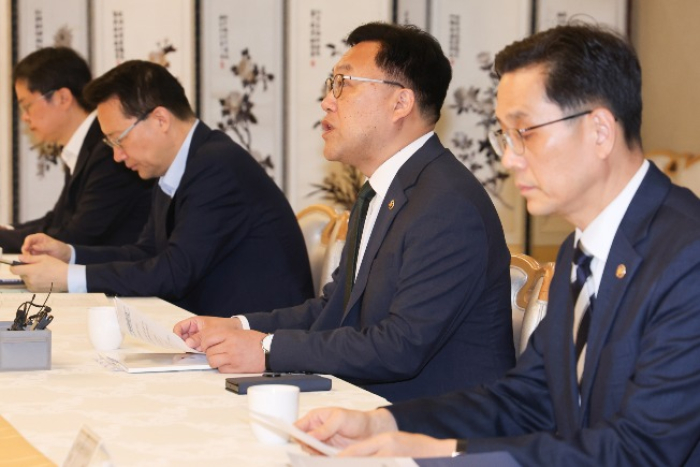S.Korea’s inflation holds below 3% for 3rd straight month
The Korean government expects the country's inflation will stabilize in the low-to-mid 2% range in the second half of this year
By Jul 02, 2024 (Gmt+09:00)
Samsung steps up AR race with advanced microdisplay for smart glasses


When in S. Korea, it’s a ritual: Foreigners make stops at CU, GS25, 7-Eleven


Maybe Happy Ending: A robot love story that rewrote Broadway playbook


NPS yet to schedule external manager selection; PE firms’ fundraising woes deepen


US auto parts tariffs take effect; Korea avoids heavy hit



South Korea’s headline inflation stayed in the 2% range for the third straight month in June after its slowest rate of increase in 11 months, raising expectations that the country’s inflation would remain below 3% in the latter half of this year.
Consumer prices in June added 2.4% from a year ago, the lowest rise since July 2023, according to data released by Statistics Korea on Tuesday.
This is the third month in a row for Asia’s fourth-largest economy’s headline inflation to ease below 3% after choppy moves earlier this year.
The trend aligned with annual core inflation less food and energy prices tracked by the Organization for Economic Co-operation and Development (OECD), which has trended down toward the Bank of Korea’s 2% inflation target since late last year.
It increased 2.2% in June from a year earlier, unchanged from the previous month.
South Korea’s consumer inflation
(Unit: %, year-on-year)
Korea’s Ministry of Economy and Finance mainly attributed the slowdown in inflation to the eased agricultural price hikes.
The government expected the country’s inflation to stabilize at the low 2% level in the second half of this year unless the economy suffers an unexpected blow.
UNCERTAINTY LINGERS
The country’s agricultural, livestock and fishery product prices added 6.5% last month from the same month the year prior, largely due to a 13.3% on-year gain in produce prices.
But the increase in the country’s fruit and vegetable prices slowed from earlier this year when they jumped more than 30% on-year.
Petroleum product prices continued rising with a 4.3% on-year increase, the fastest since December 2022, but the addition was largely driven by last year's low base when the related prices stayed weak, according to Statistics Korea.
The finance ministry said it will keep a close eye on agricultural and petroleum prices because anticipated extreme weather events this summer and volatile international oil prices could heighten inflation uncertainty.

The related authorities have extended lowered tariffs on 28 types of fruits until the end of September while cutting import taxes on seven food ingredients to curb inflationary pressure, the finance ministry said.
The Bank of Korea also forecast the country’s inflation will continue trending downward, BOK Deputy Governor Kim Woong said, citing the low 2% level of core inflation.
But the central bank remained uncertain whether the country’s headline inflation will stabilize at its target of 2% this year, citing the sharply undervalued Korean currency against the US dollar, as well as lingering uncertainties over international oil prices, weather conditions and the country’s public tariffs.
The BOK stood pat on its policy interest rate at 3.50% for the 11th straight meeting during the last rate decision meeting in May.
Its next rate decision meeting is scheduled for Thursday of next week.
Write to Kyung-Min Kang at kkm1026@hankyung.com
Sookyung Seo edited this article.
-
 EconomyS.Korea’s inflation slows to 10-month low amid tight policy
EconomyS.Korea’s inflation slows to 10-month low amid tight policyJun 04, 2024 (Gmt+09:00)
2 Min read -
 Central bankBOK sees more uncertainty in rate cut timing, ups growth forecast
Central bankBOK sees more uncertainty in rate cut timing, ups growth forecastMay 23, 2024 (Gmt+09:00)
3 Min read -
 EconomyBOK's rate policy back to square one after GDP, Fed comments
EconomyBOK's rate policy back to square one after GDP, Fed commentsMay 03, 2024 (Gmt+09:00)
3 Min read -
 EconomyKorea’s headline inflation dips below 3% in April but erratic
EconomyKorea’s headline inflation dips below 3% in April but erraticMay 02, 2024 (Gmt+09:00)
3 Min read -
 Foreign exchangeKorean won at 17-month low on Middle East woes, Fed rate view
Foreign exchangeKorean won at 17-month low on Middle East woes, Fed rate viewApr 16, 2024 (Gmt+09:00)
4 Min read


